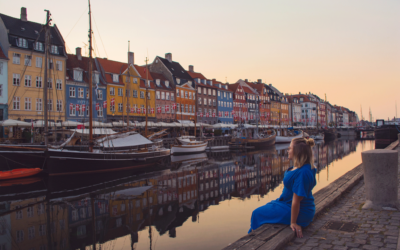Did you know that there are many accommodations that try to contribute to a green planet, by using green initiatives? Think of water-saving showers, solar panels or the use of sustainable products such as recycled toilet paper. Choosing a sustainable accommodation, compensates a little for your (flight) journey to your vacation destination. But how do you find such sustainable accommodation?
What are sustainable accommodations?

First, let’s dive deeper into the concept of sustainable accommodation. To be honest, there is no basic definition, nor are there any rules for what a sustainable accommodation should meet. Too bad because that makes it harder to find.
For example, I once came across a hotel that said they were taking sustainable steps, but when I went to check it out, I only found that they offered bicycles. It was a spa hotel in the middle of the mountains, a super popular hike destination where cars were hardly allowed. Bit of a lame initiative and pretty unfair to label it as sustainable. I don’t think renting out bikes really compensates for the amount of energy a sauna consumes. In that case, solar panels or charging stations to motivate people to arrive by electrical car, would make a bigger impact.
So, what is sustainable?
Sustainability has many definitions, and I am usually a big supporter of small initiatives. For example, many hotels these days have a card hanging in the bathroom that only towels left on the floor will be washed, thus reducing the amount of laundry. And more and more hotels have a soap dispenser in the shower instead of those little disposable plastic bottles of shampoo.
Small initiatives, but certainly in large hotels these can make a big difference. One less wash per day saves a lot of energy and water. And those little shampoo bottles are all thrown away after one use. Think of all the plastic waste!
And there are many other small sustainable initiatives, such as recycled toilet paper, a vegetable garden or chickens for fresh breakfast eggs. I once saw a hostel offering the possibility to borrow shopping bags or exchange clothes.
Big sustainable initiatives
But of course, they can take much bigger steps. Think of lamps that automatically switch off in the hallway, a revolving door that automatically stops turning, solar panels on the roof, rainwater as toilet water, individual air conditioners instead of an always-on system throughout the hotel and only cook with seasonal products or even better: their own vegetable garden and chickens.
In fact, these are truly sustainable accommodations, but there is certainly something to be said for the small initiatives as well. Some large initiatives also come with a hefty price tag, such as solar panels. Especially small accommodations don’t always have the budget for that. And not in every country are these accessible or affordable initiatives. So it is also important to consider what is feasible in a country. In Europe, Japan or America, you may well expect solar panels and sustainable building materials, especially with chains. But if you go to countries like Cuba, Malawi and even Bali, that is probably harder to find.
Choose local
Sustainable does not only mean less carbon emissions. It is also important that the tourism industry’s revenues end up in the right place. That is, a large chain, with most of its profits going to the CEO somewhere abroad, does not do much for the local economy. It creates jobs, but a big chain is also competition for small accommodation that has been run by a local family for 3 generations. The big name is well-known and familiar, and the small boutique hotel may be more expensive and unfamiliar. Out of comfort, people often choose what they know. In many places where tourism has grown rapidly within a short period of time, those small accommodations cannot compete and go out of business. This is a super shame, but it also means that locals benefit less from tourism.
So opt for small, local accommodation rather than big chains. You can often find some information about the hotel in the description, that it is a family-run business or has been around for 100 years, for example. Many of them also have initiatives where part of the proceeds go to local organisations. Often they are too small for the solar panels and big sustainable initiatives. But that role within the local community is an important part of responsible tourism.
How to find sustainable accommodation?
Finding sustainable accommodations can be a challenge. Despite the fact that more and more people are looking for sustainable options, there are actually few places where you can easily find it. Still, there are some websites you can check out.
Ecolabels tourism sector
There are several eco-labels for the tourism sector that you can consult. Unfortunately, as with any sustainable label, it is difficult to keep track of which labels hold which qualifications. Of course, you can read about this on the hotel websites themselves, but there are quite a few. Moreover, the company itself must submit an application and there are also costs involved. Many companies choose only one label or skip it altogether. Nevertheless, there are some that are worth remembering:
- Greenkey, check out their map to see which hotels, campgrounds and small accommodations have received the label.
- Bio hotels places a strong emphasis on organic, sustainable and local products. Both for the food and drink in the hotel and non-food, such as soaps, towels and toilet paper.
- NOCO2 is a label for companies that are completely carbon neutral, which means that they not only reduce their emissions but also compensate them, for example by planting trees.
- The international eco-certification program is for accommodations that are located in nature and do their best to make as little impact as possible, or even take extra steps to teach guests more about nature. Think of offering educational excursions or hiking tours with information posts.
- The Green Globe certificate is another good indicator. The companies on it are re-inspected twice a year, so you can be sure that everything is alright.
And a whole lot more. For a complete list of eco-labels, you can look at the eco-label index. There you will also find, for example, labels for specific locations, such as the Czech Republic, Luxembourg or Malta. But also for the most ecological beaches or specifically for restaurants.
Websites for sustainable accommodations
There are also a lot of websites specifically for sustainable accommodations. That saves a lot of research. However, not all accommodations are listed on all these websites. Again, there are often strict requirements that a sustainable accommodation must meet, so the hotels that do their best, often fall short. But it is definitely a good place to make sure that your hotel, hostel, B&B or vacation home is sustainable.
Some examples:
- Nature house is an ideal website for nature lovers. As the name suggests, you can find cottages in the middle of nature. You have to search which accommodations also take sustainable steps, but at least €1 of your booking goes to organisations for nature conservation, such as the Forestry Commission and the Bird Protection Society. You can find cottages throughout Europe.
- Ecobnb is the sustainable counterpart to Airbnb. Here you can find everything from B&B’s to tree houses, all with a sustainable approach.
- Eco Hotels is one of the biggest websites in sustainable accommodations. Aside from offering sustainable options, they also plant a tree for every booking!
- Camping can be sustainable too. At Homecamper | Campspace, you book a spot at small-scale campsites with sustainable initiatives. For example, at a farmer’s field, which generates energy with its own windmill.
And there are many more and more to come. Sustainable travel is becoming increasingly popular, and you can tell by the range of products on offer.
This website
Of course, I’m also here to help you make your trip more sustainable! This is only an introductory article for a whole series of articles on sustainable accommodations. I will definitely try out a lot of nice places myself during my own travels, and share my experiences with you. But expect more tips & tricks on what to look for when choosing sustainable accommodation.
Do you already have questions? Then let me know below or send me an email or message via social media. Maybe I can help you right away and maybe you’ll inspire me for my next blog article





0 Comments